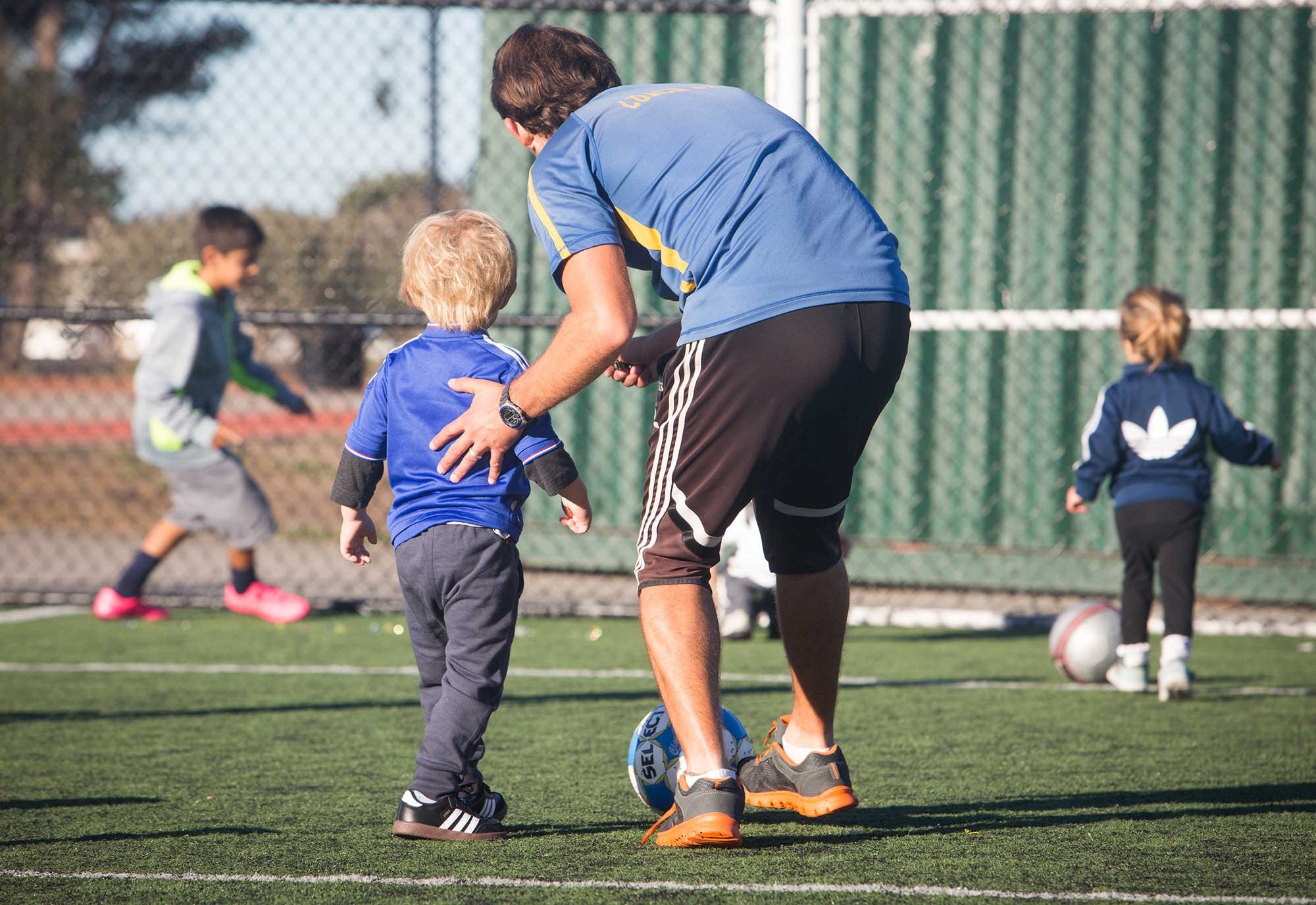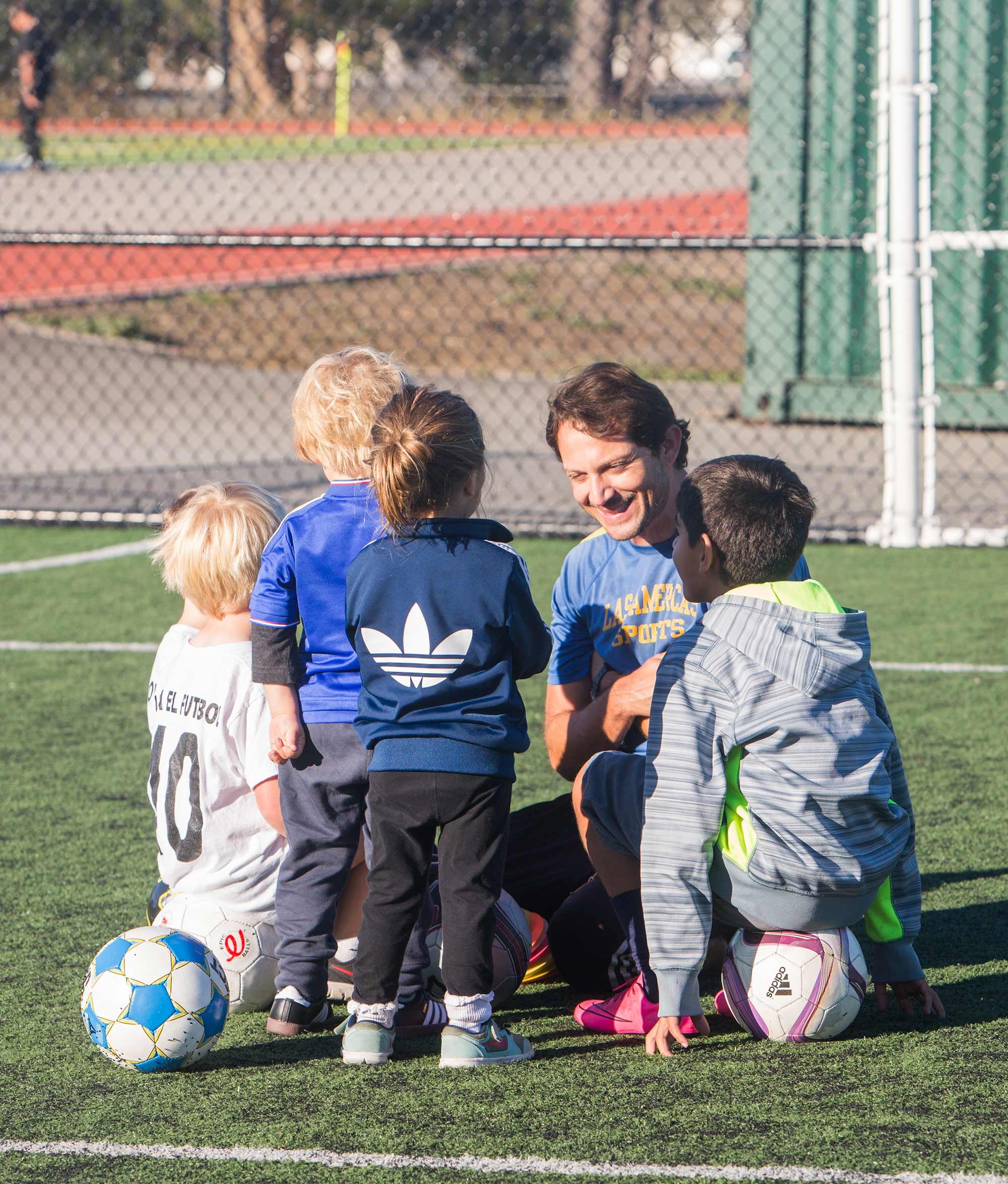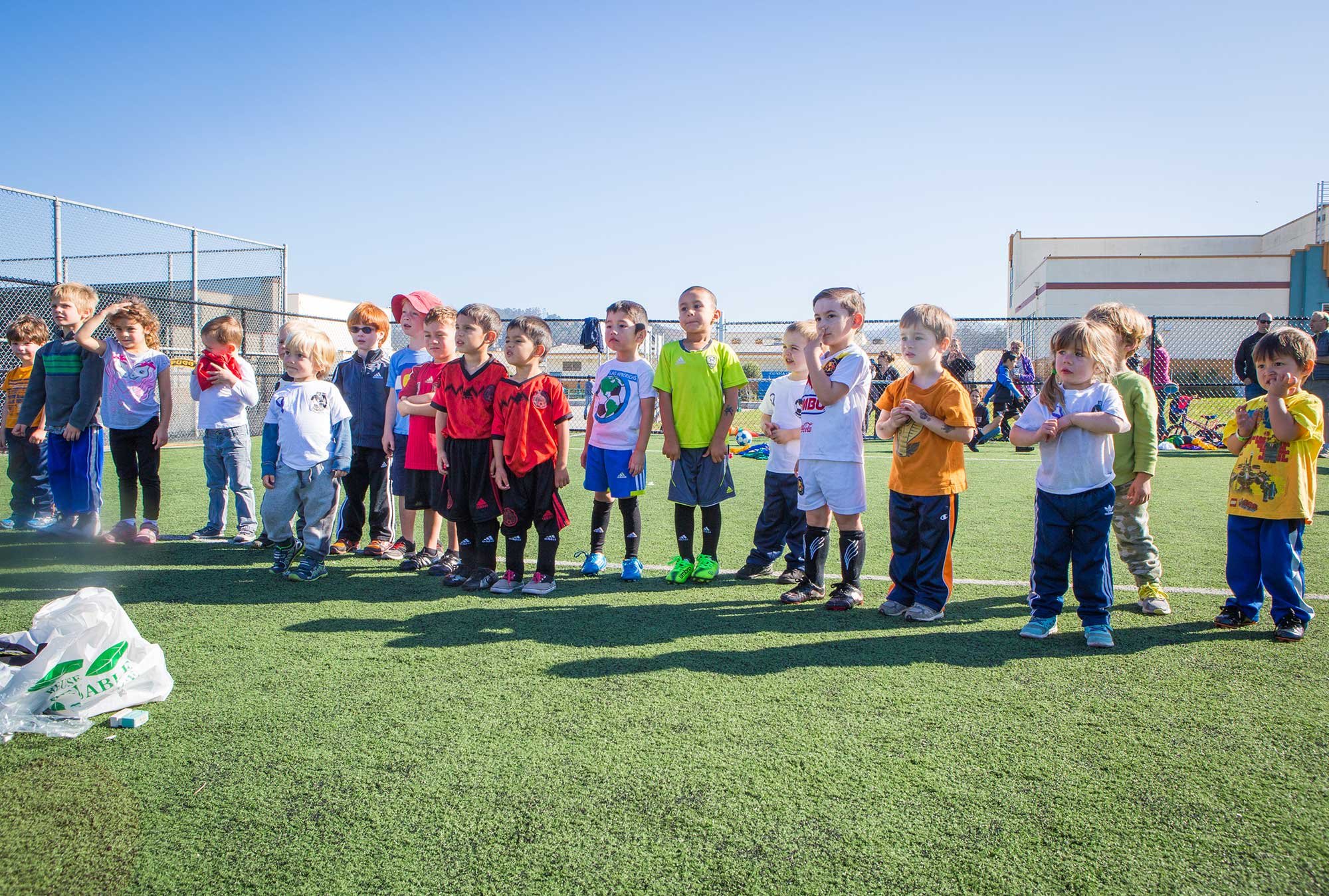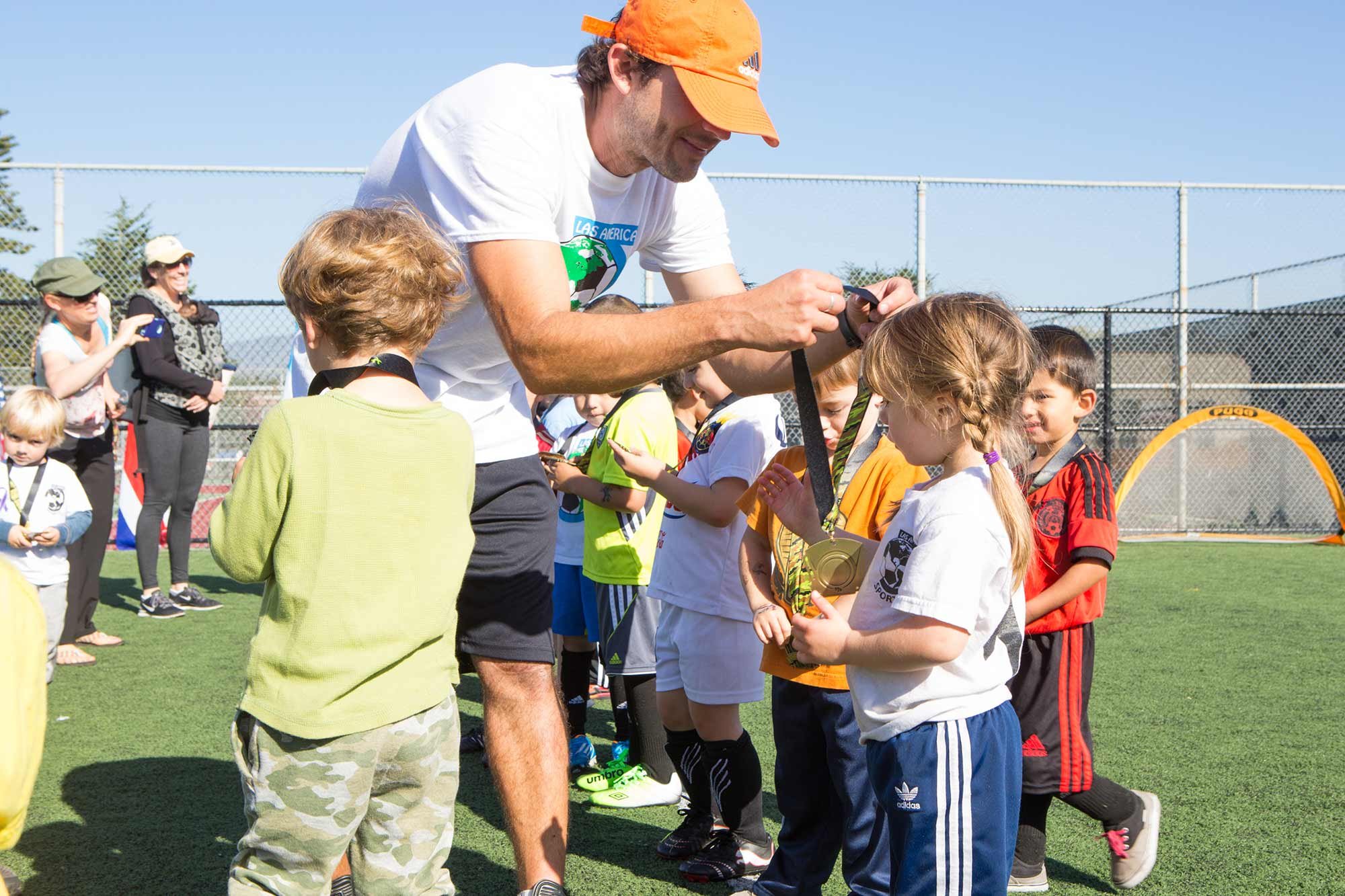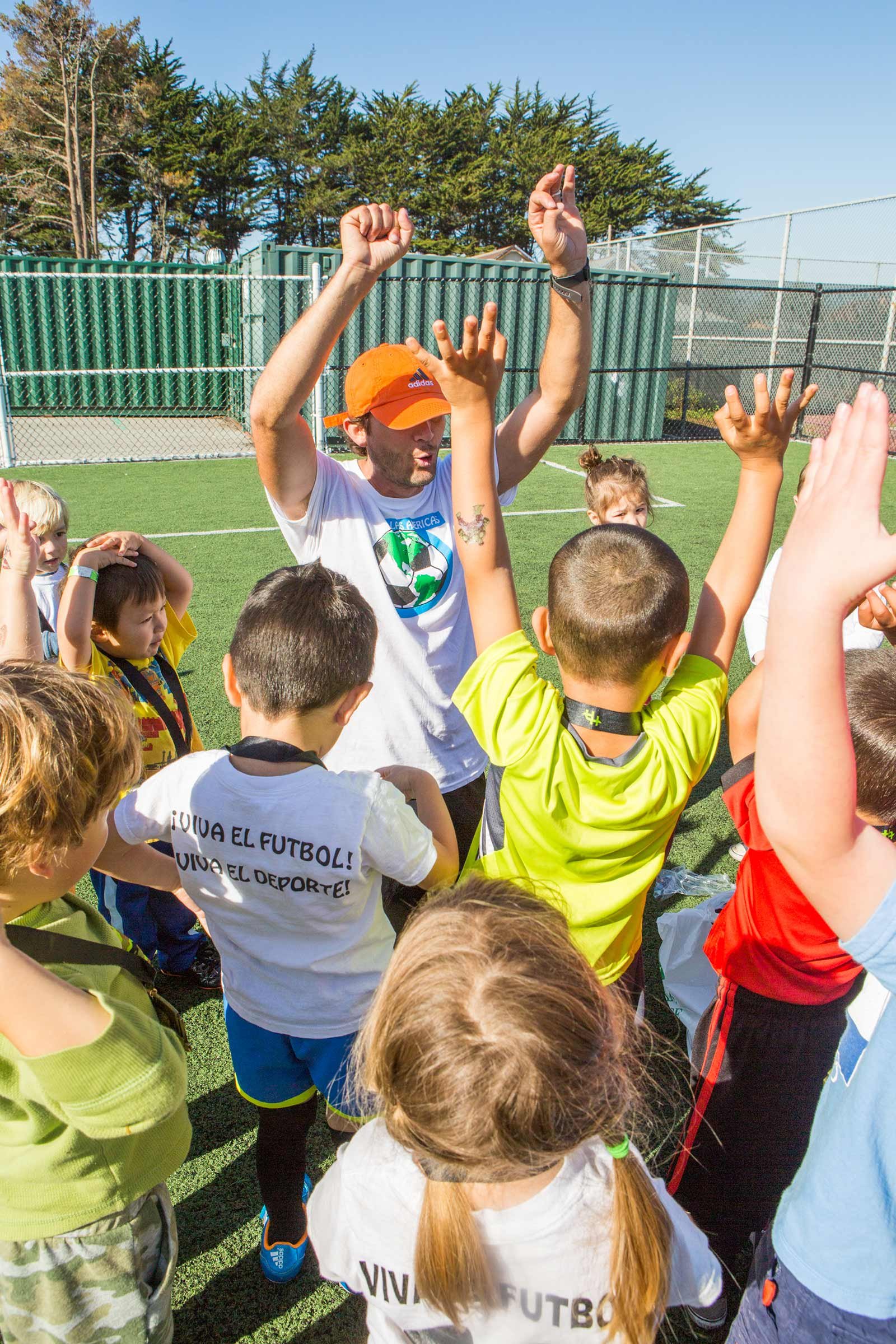“I didn’t see myself as a coach. I felt like I had failed. So I was like, how can I become a coach? That was my mentality. If I didn’t make it all the way, how am I going to become a coach. But I was so wrong.”
— Jaime Carrasco

Jaime Carrasco, Soccer Coach
Story and photos by Cat Cutillo
It’s Saturday morning and Coach Jaime Carrasco is revving up his soccer team for the next drill in Cunha Intermediate School soccer cage. He has to kneel down so he can look his players in the eye. Most of them are just over three feet tall.
“All of you guys are fishies and Coach Jaime is a shark. When I blow the whistle you have to run to the fence and stay there. Don’t let the shark get you,” says Carrasco, a Half Moon Bay native.
There is a moment of heavy uncertainty for the sidelined parents as they watch to see what actually happens when the whistle blows. Will their toddler opt to dive tackle a teammate instead or will they wander off and start picking at the grass again?
The whistle blows and each player dribbles a soccer ball as fast as possible to the fence. They are focused. They are giving it their all.
Carrasco is the only one who doesn’t look surprised.
“I love coaching the younger children because you tell a young child to do two cartwheels and he’ll not only do two—he’ll do three or five,” he says.
That type of commitment is something Carrasco understands well.
At 13, his parents divorced and he moved from Half Moon Bay to Mexico to live with his grandmother. Soon after, Carrasco was invited to play for the popular Mexican soccer team, Chivas. Six days a week he left his house at 4:45 a.m., walked four miles in the dark to the nearest bus stop, rode for over an hour on the bus only to catch two more busses just to get to the Chivas headquarters. Once there, he faced an intense two-hour training session. His journey home was the same in reverse.
“The only light that I had was the moon,” says Carrasco. “But from there I learned discipline, I learned dedication and I had really good coaches.”
One of those coaches often gave Carrasco a ride home and offered advice that went far beyond the soccer field.
“Try to live with all your heart and always have a plan. Don’t go to the soccer field scratching your head saying, ‘What am I going to do today?’ You always have to be prepared,” Carrasco said. “I think that goes for every job, not only for coaching.”
Like most of his teammates, Carrasco left school at age 15 to focus entirely on soccer. He had his sights set on making first division, the pros. During his six years with Chivas he rose to second division, but then the unthinkable happened. He suffered a horrific back injury at 18 that left him unable to walk at first.
“After my back injury I was never the same soccer player. In Mexico, my soccer career was over. It was hard for me. I became depressed,” says Carrasco. “My mistake is I didn’t have a plan B.”
In the way that some might turn to drugs or alcohol, Carrasco says he turned to traveling. He got on a bus and journeyed alone to South America for the next seven years.
“I just wanted to escape,” he says. “I just wanted to get away from everybody.” But something happened. Carrasco fell in love with Rio De Janeiro. He decided to stay.
There, he met a mentor, a man named Simon who was from Africa and had played soccer professionally in France before also suffering an injury. He encouraged Carrasco to join him in coaching.
“I didn’t see myself as a coach,” says Carrasco. “I felt like I had failed. So I was like, how can I become a coach? That was my mentality. If I didn’t make it all the way, how am I going to become a coach. But I was so wrong,” he said.
Now, more than 10 years later, Carrasco owns his own soccer coaching company called Las Americas Futbol, and he coaches in Half Moon Bay and throughout San Mateo and Santa Clara Counties.
“It shocks me that he knows everybody’s name,” says Kate Bello, whose 3-year-old son, Brody, takes lessons in Half Moon Bay. “You can see how passionate he is about the sport and he wants to pass that onto the kids.”
But Carrasco says the kids give him as much in return. His own mom recently started chemotherapy for lung cancer. A day after her first chemotherapy treatment, he was coaching in Sunnyvale when one of his 4-year-old players ran away from the soccer field, ignoring his pleas to come back. When she returned she had her hands hidden behind her back before revealing she had a flower.
“(She said,) ‘ Coach, I’ve noticed that you’ve been really sad and I got this for you.’ She doesn’t know that my mom got chemotherapy,” says Carrasco. “Children have this gift, this energy.”
He says he keeps his prices low so all families can afford the program and coaches in both English and Spanish, chanting “Viva Futbol” at the end of every practice which means “Hooray for soccer.”
“He’s the best with the kids. He goes so far over the top,” says Alex Kay, whose son Rowan has been taking lessons for about a year.
Kay says he is constantly impressed that Carrasco gives every child a team T-shirt at the beginning of the 10-week session and awards every child with a medal at the final practice, during a special awards ceremony.
“I want children to understand that when you try hard, you’re going to get something back,” says Carrasco. “For lots of them it’s their first medal. It’s their first award. It’s just to let them know that more than anything, it’s a pleasure to be their coach.”
Against the Tide: Jaime Carrasco



